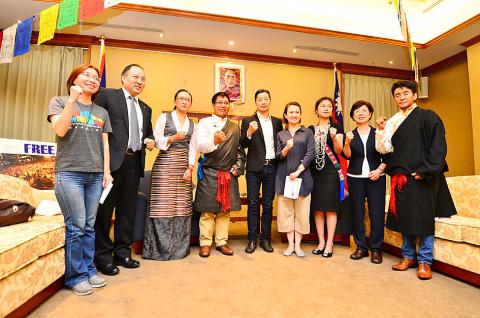A Taiwan Parliamentary Group for Tibet was established yesterday by national legislators, with the group’s leadership promising to push for legislation to abolish the Mongolian and Tibetan Affairs Commission and create a mechanism for Tibetans to use refugee status to gain legal residency.
New Power Party (NPP) Legislator Freddy Lim (林昶佐) and four Democratic Progressive Party (DPP) legislators met in a Legislative Yuan guest room decorated with Tibetan prayer flags and a portrait of the Dalai Lama to announce the establishment of the group. Several Tibetan legislators and representatives were also in attendance.
Lim — who serves as group president — said that more than 30 legislators had agreed to affiliate themselves with the group.

Photo: Wang I-sung, Taipei Times
In a break with the past internal DPP caucus “Tibet Working Group,” the parliamentary group boasts cross-caucus membership from NPP legislators and Chinese Nationalist Party (KMT) Legislator Wang Jin-pyng (王金平), he said, adding that no other KMT legislators have joined thus far.
“We will focus on substantial legislation first, with some complementary symbolic work,” Lim said, adding that the group would prioritize abolishing the Mongolian and Tibetan Affairs Commission and push for a refugee act.
Tibetans who have come to Taiwan over the past decade are now stranded because their Nepalese passports have expired. Nepal began denying passport renewal services several years ago under Chinese pressure.
However, most have been denied legal residency because of a lack of refugee provisions within current immigration standards, keeping them from accessing healthcare and forcing them to work in the underground economy.
“Establishing this group has been my dream for more than four years,” said Tashi Tsering, a Tibetan leader of the Human Rights Network for Tibet and Taiwan, which Lim said provided the key impetus for establishing the group.
When group members began lobbying national legislators several years ago, initially only DPP Legislator Hsiao Bi-khim (蕭美琴) was willing to provide help, Tashi said, adding that a limited number of interested legislators has prevented the establishment of a formal group in the past.
“Official establishment will enable us to tackle bigger and more public tasks,” he said.
“I am honestly not entirely sure what the difference is between a ‘parliamentary group’ and the past ‘working group,’ but the ‘working group’ was established by only two or three legislators,” said Dawa Tsering, who serves as the representative to Taiwan of the Dalai Lama’s Tibet Religious Foundation.
Tashi also expressed support for abolishing the Mongolian and Tibetan Affairs Commission, a vestige of the Republic of China’s claims to sovereignty over Mongolia and Tibet.
“As Tibetan human rights have degenerated in recent years and many people have self-immolated, the commission has not done anything — no events or actions whatsoever and not a penny of money for the cause of Tibetan human rights,” he said, calling the commission “useless.”
“They use the banner of Tibet to take a lot of money from Taiwanese taxpayers, but we have no idea how they spend it,” he said.
Lin Shuya (林淑雅) — one of the founders of the Human Rights Network for Tibet and Taiwan — reiterated group calls for the Legislative Yuan to issue an official invitation to the Dalai Lama.

SECURITY: As China is ‘reshaping’ Hong Kong’s population, Taiwan must raise the eligibility threshold for applications from Hong Kongers, Chiu Chui-cheng said When Hong Kong and Macau citizens apply for residency in Taiwan, it would be under a new category that includes a “national security observation period,” Mainland Affairs Council (MAC) Minister Chiu Chui-cheng (邱垂正) said yesterday. President William Lai (賴清德) on March 13 announced 17 strategies to counter China’s aggression toward Taiwan, including incorporating national security considerations into the review process for residency applications from Hong Kong and Macau citizens. The situation in Hong Kong is constantly changing, Chiu said to media yesterday on the sidelines of the Taipei Technology Run hosted by the Taipei Neihu Technology Park Development Association. With

CARROT AND STICK: While unrelenting in its military threats, China attracted nearly 40,000 Taiwanese to over 400 business events last year Nearly 40,000 Taiwanese last year joined industry events in China, such as conferences and trade fairs, supported by the Chinese government, a study showed yesterday, as Beijing ramps up a charm offensive toward Taipei alongside military pressure. China has long taken a carrot-and-stick approach to Taiwan, threatening it with the prospect of military action while reaching out to those it believes are amenable to Beijing’s point of view. Taiwanese security officials are wary of what they see as Beijing’s influence campaigns to sway public opinion after Taipei and Beijing gradually resumed travel links halted by the COVID-19 pandemic, but the scale of

A US Marine Corps regiment equipped with Naval Strike Missiles (NSM) is set to participate in the upcoming Balikatan 25 exercise in the Luzon Strait, marking the system’s first-ever deployment in the Philippines. US and Philippine officials have separately confirmed that the Navy Marine Expeditionary Ship Interdiction System (NMESIS) — the mobile launch platform for the Naval Strike Missile — would take part in the joint exercise. The missiles are being deployed to “a strategic first island chain chokepoint” in the waters between Taiwan proper and the Philippines, US-based Naval News reported. “The Luzon Strait and Bashi Channel represent a critical access

Pope Francis is be laid to rest on Saturday after lying in state for three days in St Peter’s Basilica, where the faithful are expected to flock to pay their respects to history’s first Latin American pontiff. The cardinals met yesterday in the Vatican’s synod hall to chart the next steps before a conclave begins to choose Francis’ successor, as condolences poured in from around the world. According to current norms, the conclave must begin between May 5 and 10. The cardinals set the funeral for Saturday at 10am in St Peter’s Square, to be celebrated by the dean of the College